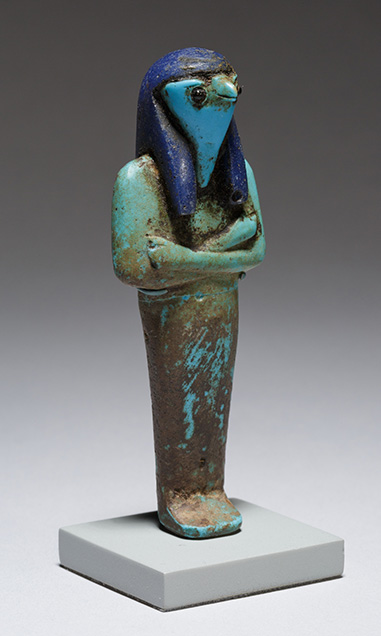Difference between revisions of "Template:POTD protected"
Jump to navigation
Jump to search
Occultwiki (talk | contribs) |
Occultwiki (talk | contribs) |
||
| (22 intermediate revisions by the same user not shown) | |||
| Line 1: | Line 1: | ||
{| role="presentation" style="margin:0 3px 3px; width:100%; text-align:left; background-color:transparent; border-collapse: collapse; " | {| role="presentation" style="margin:0 3px 3px; width:100%; text-align:left; background-color:transparent; border-collapse: collapse; " | ||
|style="padding:0 0.9em 0 0;" | [[File: | |style="padding:0 0.9em 0 0;" | [[File:Qebehsenuef Figure.jpg|300px|thumb|]] | ||
|style="padding:0 6px 0 0"| | |style="padding:0 6px 0 0"| | ||
'''[[ | '''[[Qebehsenuef]]''' is one of the four sons of [[Horus]], along with [[Hapy]], [[Duamutef]], and [[Imsety]]. Qebehsenuef is usually portrayed with the head of a falcon. In a funerary context, he was responsible for protecting the intestines of mummified people. As ruler of one of the four cardinal directions, Qebehsenuef was associated with the west. Although Qebehsenuef is most prominently found in funerary context as a canopic jar, he is possibly more closely associated with the [[Egyptian decans]]. Dutch Egyptologist Maarten Raven argues that the four sons originated as celestial deities, given that the [[Pyramid Texts]] frequently connect them with the sky and that [[Horus]] himself was a sky deity. | ||
<p><small>Photo credit: The Metropolitan Museum</small></p> | |||
<p><small> | |||
[[:Category:Images|'''(More Images)''']] | [[:Category:Images|'''(More Images)''']] | ||
<div class="potd-recent" style="text-align:right;"> | <div class="potd-recent" style="text-align:right;"> | ||
Latest revision as of 16:23, 17 October 2025
|
Qebehsenuef is one of the four sons of Horus, along with Hapy, Duamutef, and Imsety. Qebehsenuef is usually portrayed with the head of a falcon. In a funerary context, he was responsible for protecting the intestines of mummified people. As ruler of one of the four cardinal directions, Qebehsenuef was associated with the west. Although Qebehsenuef is most prominently found in funerary context as a canopic jar, he is possibly more closely associated with the Egyptian decans. Dutch Egyptologist Maarten Raven argues that the four sons originated as celestial deities, given that the Pyramid Texts frequently connect them with the sky and that Horus himself was a sky deity.
Photo credit: The Metropolitan Museum |
